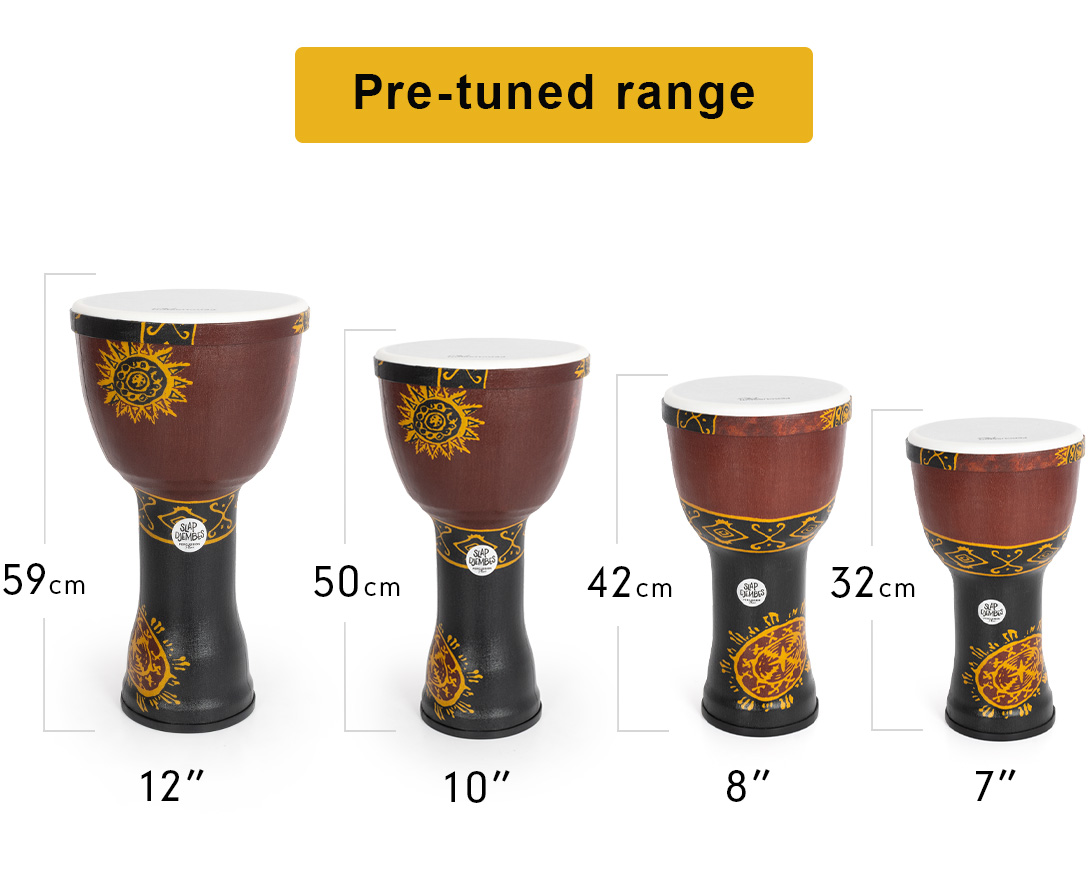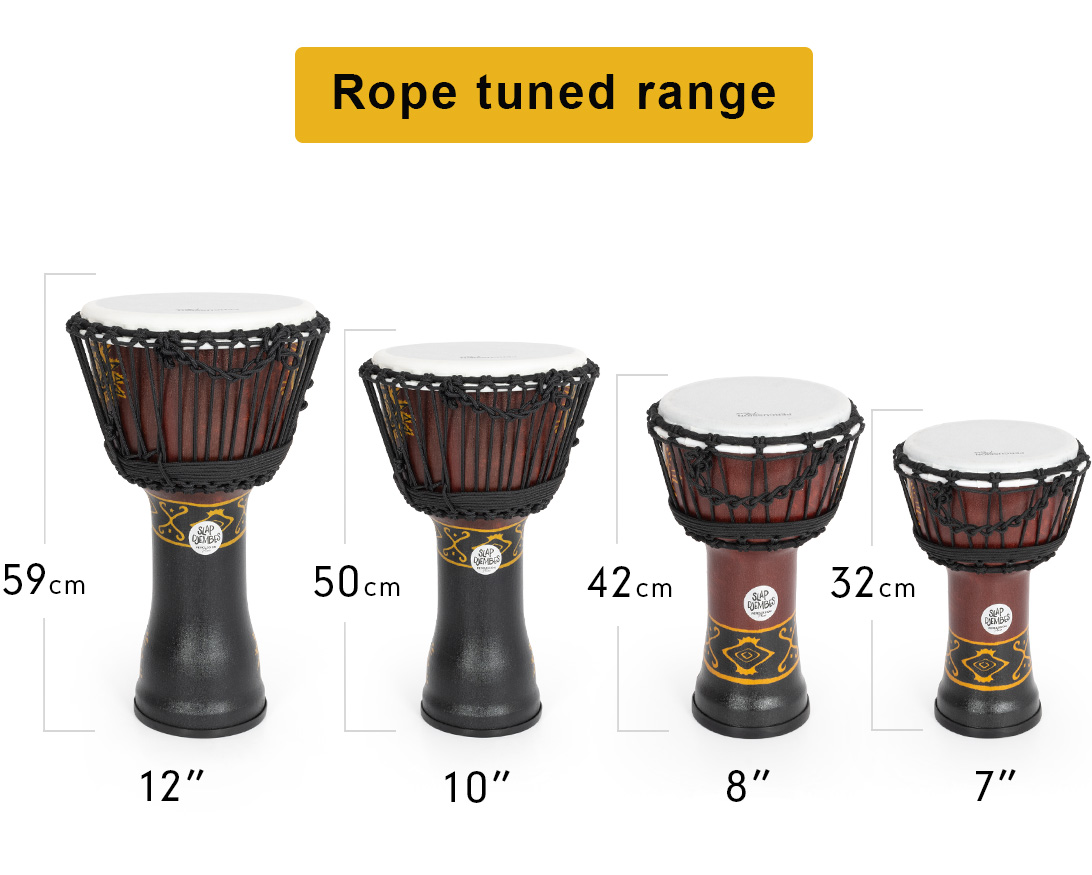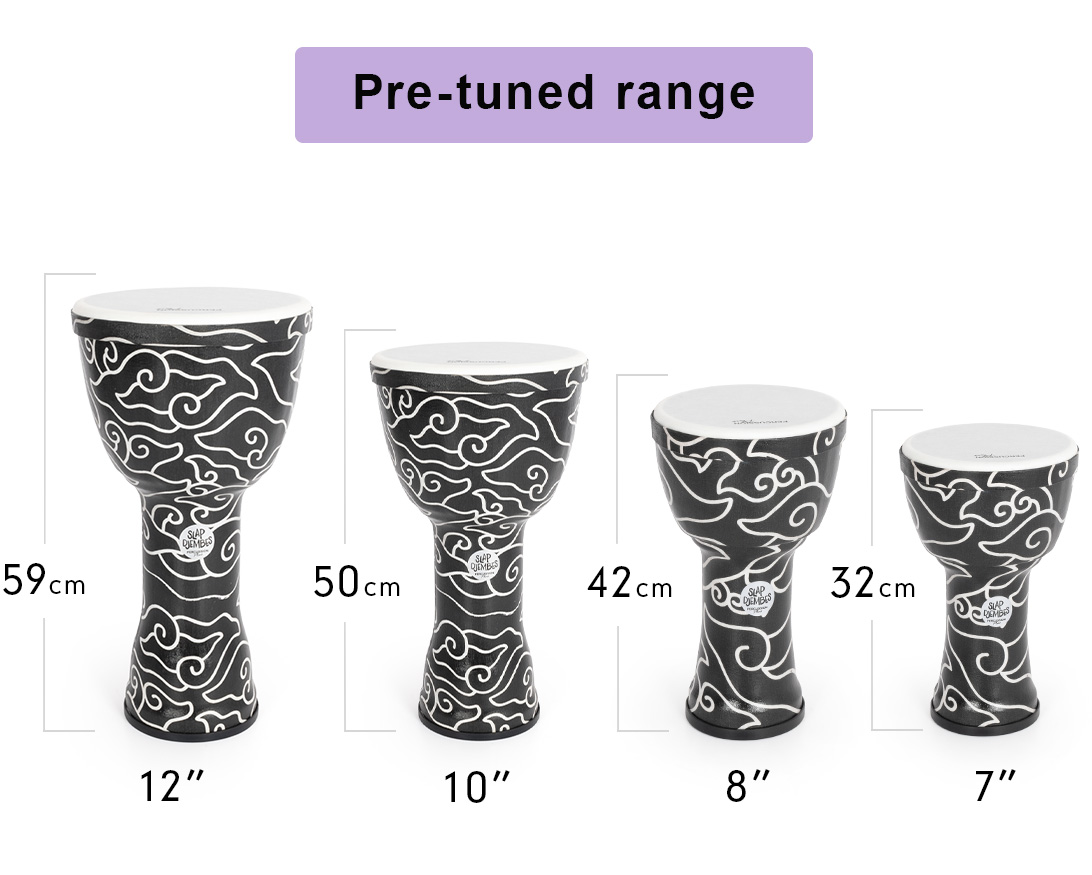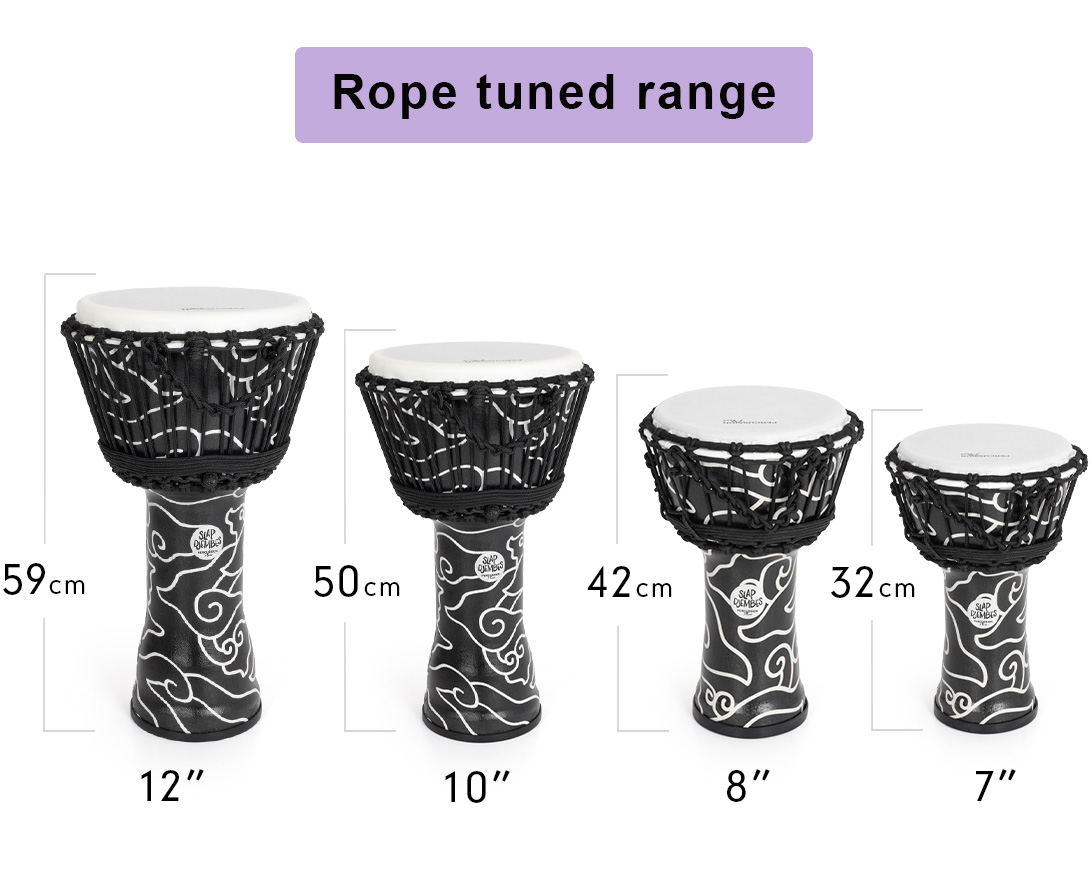Percussion Plus’ iconic Slap Djembe range has proven hugely popular in music education circles since its inception in 2020. Part of that is down to their unique instructive drum heads which help even complete novices to play in ensembles right away, but an equally big factor is the quality of their construction and sound. With that in mind, a common question we’re asked is whether you can get a Percussion Plus djembe without the printed drum head, for more experienced players.
Well, now you can!
The Bali and Ubud djembes feature the same build specifications as the World and Carnival Slap Djembes, but with a plain drum head. This means you get the punchy resonance, durability, and lightness of the Slap range, but in a form more suited to advanced players who do not need a reminder of where to strike the drum for different sounds and patterns. Not only that, but these djembes are some of the best value on the market, offering fantastic sound quality and longevity at impressively low prices.
The best value djembes on the market?
Like the World and Carnival ranges, Bali and Ubud djembes are manufactured in the world’s foremost djembe-making facility in Bali, Indonesia. Already in partnership with a number of major percussion companies like Toca, Meinl and Pearl, the factory provides unrivalled quality. What’s more, Bali and Ubud djembes provide even better value than these counterparts.
Toca’s famous Freestyle series comes with similar benefits – a range of sizes, strong synthetic shells and various decorative finishes. Their Coloursound packs can be found in many a classroom too, with a selection of vibrant block colours livening up each set. However, these djembes sit at a considerably higher price point than the Percussion Plus models, despite equivalent specifications.
Meinl also offer a renowned djembe range – for instance, their nesting ‘Viva Rhythm Boom’ series features a clever nesting storage solution, where the heads ‘pop off’ and the djembes can sit inside one another. This makes them a great option for those who are struggling for space, but again they come at a higher price. Meinl’s ‘Travel’ series, comparable to the Toca Freestyle and some Pearl alternatives, is also popular, and their ‘Headliner’ drums boast a mahogany shell for a more deluxe feel.
At a premium price, the Remo kids djembe features their signature ‘Acousticon’ shell (multiple thin plies of 100% recycled wood-fibre materials) and a ‘Skyneep’ head (graphic infusion of pigment into a polyester surface). These features certainly make for a worthy education drum, but at over four times the price of a similarly sized Percussion Plus djembe, they represent a daunting investment for many departments.
How are the Bali and Ubud djembes made?
The major reason that the Bali and Ubud djembes are such great value is the expertise and efficiency of the Bali factory. This facility owns a number of global patents relating to djembes, including one for the manufacturing of drums from Polyvinyl Chloride (PVC):
Polyvinyl Chloride (PVC) - the world's third-most widely produced synthetic polymer of plastic. It is known for its durability, versatility, and cost-effectiveness and is widely used in the construction industry for pipes, doors, roofing and more.
Robustness and resonance have long been major selling points of Percussion Plus Djembes, and the PVC shell is vital to both. In schools, it helps to make departmental investment more viable in the long term, but it’s also a bonus for those buying for themselves; you can reliably take a Bali or Ubud djembe to a drum circle and know that you’ll cut through with a great tone. If you’re taking your djembe to a festival or going busking, you can rest assured that the drum can take a few knocks and survive just fine.
PVC is very lightweight too, making the drums easier to carry around for even the youngest pupils, and they’re also fitted with a rubber ring base to prevent slippage.
- Rope tuned, where the head is pulled for tension using ropes in a skilled hand-crafting process.
- Pre-tuned, where the heads are stretched and then kept resolutely in place by safe, industrial strength glue.
The drum heads are made from synthetic Mylar composite 'Fiberskin'—a biodegradable, water-resistant material engineered to resist breakage, stretching, and fluctuations in humidity. Compared to natural (animal) skin, synthetic materials offer distinct ethical advantages by avoiding animal harm and enabling a more sustainable production process. They also present significant allergenic benefits, being hypoallergenic, low-maintenance, and resistant to common allergens. With a feel and sound comparable to traditional skins, synthetic drum heads have become a preferred choice for many musicians and ethically conscious consumers alike.
Bringing the design to life
Djembes originated as community instruments in West Africa and have featured decorative elements for most of their history. Naturally then, it’s important that Percussion Plus’ djembes feature an appropriately interesting and high-quality finish. The Bali and Ubud djembes feature stunning sarong wrap designs, adding a beautiful, traditional touch. Sarongs are large pieces of fabric commonly worn in Southeast Asia, Africa, and the Pacific, known for their intricate prints and cultural significance. Bali and Ubud djembes feature two distinct designs:
Bali – elegant earthy tones with vibrant sunny emblems:
Ubud – a striking monochrome pattern:
Safeguarded with a clear acrylic emulsion coating, the designs really pop off the body, and are very resistant to marking and scratches.
Rigorous quality control
The factory's excellent quality control is underpinned by two key regimens:
- Materials are all sourced from reputable, registered suppliers and approved by the Indonesian government.
- On-site quality control experts inspect each drum before it is approved, minimising the risk of faulty or substandard drums.
With over 25 years of experience manufacturing drums for many of the world’s leading brands, the factory has refined its processes to operate efficiently and effectively. Representatives from Percussion Plus have visited Bali factory in person, observing the instrument production process with great satisfaction.
“Building on the success and quality of the World and Carnival Slap Djembe ranges, we’re thrilled to continue manufacturing in Bali with the aptly named ‘Bali’ and ‘Ubud’ ranges. Broadening the appeal of our djembes to more advanced players is an exciting step, and our production process provides a wonderful foundation from which to do so.”
Still want a Slap Djembe?
If you’re taken with the design of an Ubud or a Bali djembe, but still want the instructive ‘Slap’ drum head for inexperienced players, we’ve got you covered!
Ubud Slap Djembes are available in 7” and 8” sizes, and a Bali version in 7”. This allows you to give some younger learners a taste of playing with a more experienced drum circle without compromising the uniformity of its look, should you so desire!
In conclusion…
The Bali and Ubud djembes represent an exciting evolution in the Percussion Plus djembe family, offering the same exceptional build quality as always, resonance, and durability, but in a form tailored to more experienced players. With their strong, resonant shells, striking sarong designs, and eco-conscious materials, the value of these djembes more than holds its own against similar drums from other brands.
The bottom line is that whilst there are many viable djembes out there, these Bali and Ubud ranges really are worth considering; their low prices do not come at the sacrifice of quality. Whether for education, performance, or just for fun, they deliver high-level features at excellent value.










